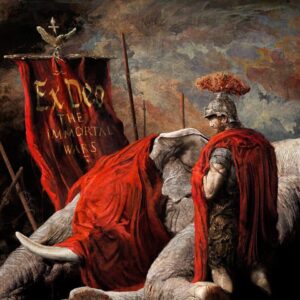When it comes to death metal, brevity is often sanctity. You need to hit fast and hard, maintaining focus and aggression without meandering to the point that the impact is lost and this is something that Ex Deo fully appreciate. An offshoot of the rightly acclaimed Canadian death metal force that is Kataklysm, Ex Deo is a project born out of passion and it provides an opportunity for frontman Maurizio Iacono to explore his family’s Italian heritage, digging deep into the oft-fantastic history of the Roman Empire, drawing parallels to the modern world and bringing one of the most vivid, and visceral, periods of human history to life. Although Ex Deo have already released two albums, 2009’s ‘Romulus’, which provided a glimpse into the foundation of Rome, and 2012’s justly praised ‘Caligvla’, which nominally focused on two of Rome’s most notorious Emperors (the titular Caligula and his immediate forebear, Tiberius); this is their first full-blown concept record, dealing exclusively with the battle of wits between the Carthaginian Hannibal, who, having marched an army across the Alps, occupied much of Italy for almost fifteen years, and the Roman General, Scipio, who was to defeat Hannibal at the Battle of Zama. It is a thrilling period of history, rich in drama and epic battles, and it is the perfect subject matter for ‘The Immortal Wars’. Rife with potent imagery and with the necessary sense of high drama that lies at the heart of any great conceptual piece, ‘The Immortal Wars’ cleverly treads the line between the cerebral and the brutal and while the first instinct maybe to headbang until you’re giddy, the cleverly constructed lyrics and dense, tightly-plotted atmosphere will keep you coming back for more long after the initial thrill has worn off.
Opening with the synth-infused ‘The rise of Hannibal’, ‘The immortal wars’ immediately grabs the attention with its depth and scope. Edging into the same rich orchestral territory as Dimmu Borgir’s ‘Death Cult Armageddon’, Ex Deo have pulled out all the stops, but where Dimmu’s influence was primarily within the realm of Star Wars composer John Williams, Ex Deo opt for Hans Zimmer whose work, aptly, includes Gladiator. The orchestration, actually produced and arranged by Clemens Wijers (who has an impressive background in movie score composition), is outstanding and sounds thrillingly organic, set perfectly against Ex Deo’s ferocious and technically-brilliant death metal. Right from the start the band keep things remarkably concise and so, although there is a spectacular sense of the epic, they don’t milk ideas, dispatching each of the eight tracks with remarkable clarity. Maurizio is in his element here, playing the characters with a theatrical flourish that helps drive the narrative forward, and his intelligent, carefully-focused lyrics delve into the motivation that fuelled the hate-filled Hannibal in his Campaign of terror against Rome. With Hannibal’s early years dealt with, Maurizio and his troops get straight to the point with ‘Hispania (siege of Saguntum)’, a blistering portrayal of Hannibal’s campaign against the Roman ally. Churning death metal guitars ride up against trilling strings and yet, for all of the atmospheric depth the orchestrations bring, the band never allow their ambitious arrangements to detract from the surging riffs and, at the very heart of the music, lies Oli Beaudoin’s astonishing performance on drums. A human octopus, Oli seems to relish the challenge of coming up against a full-blown orchestra and to hear his furious fills face off against the seismic depth-charge of the timpani is a thing of wonder. Perhaps Hannibal’s most well-known exploit, ‘the crossing of the Alps’ details the death-ride of Hannibal’s great army as he attempted the seemingly impossible. Marching across the frozen wasteland of the majestic mountain range into Northern Italy, it says much of Hannibal’s skills as a leader and sheer magnetism that he convinced his army to engage in such a daring feat, and yet his strength of will was such that he not only successfully made the crossing, but proved a formidable opponent to Rome having so done. Such a tale of Nietzschean will is the perfect subject matter for a ferocious death metal track, and so it proves with J-F Dagenais and Stephane Barbe laying down riffs and epic solos with abandon as Maurizio relates the tale with admirable clarity and power. The first half of the album concludes with a brief interlude in the form of ‘Suavetauriia’, which signals a shifts in perspective to that of the Roman generals tasked to defeat Hannibal’s brutal advances. A dark, atmospheric piece of music it highlights the cinematic ambitions that lie at the heart of the album and recall the striking orchestral intermissions found in the gargantuan movies of the 1950s such as ‘Lawrence of Arabia’.
Warning: This video is awesome but very NSFW!
Sent North to stem the tide of Hannibal’s seemingly unstoppable army, Cato delivered numerous speeches to his army that ended with the battle cry “Carthago Delenda Est!” – “Carthage must be destroyed!” Represented by some of the most brutal metal yet found on the album, ‘Cato Major’ heralds the arrival of Scipio, the Roman General fated to defeat Hannibal, and it pulls no punches. Huge, daunting riffs dart overhead like streaks of lightening and, as the thunder, Maurizio appears swathed in chaos, exhorting long dead troops to rise once more and invade the popular consciousness. The track segues directly into the stirring ‘Ad Victoriam (the battle of Zarma)’ which utilises the imperial tone of the brass section to summon the gruelling mid-tempo riffs that characterise the song. It is here that Scipio is bought to life in exhilarating fashion, barking orders to his unseen troops as a veritable tsunami of riffs tear into Hannibal’s frontline. With the battle over and Hannibal defeated, ‘The spoils of war’ deals with the bloody aftermath of victory. With approximately ten times as many dead in the Carthaginian army as the Roman, the destruction of the enemy at Scipio’s hands was complete and with swirling strings and devastating riffs, Ex Deo paint a particularly bloody picture of a battlefield turned graveyard. Climactic and dauntingly heavy, ‘the spoils of war’ juxtaposes mid-tempo passages with fast-paced moments of pure metal savagery that are impossibly exciting. The final track, ‘The Roman’, shifts focus once again and paints a picture of the ordinary Roman Soldier, infused with a love of the homeland and bathed in the virtue of their mission. It is a brilliant summation of the strengths of the album in microcosm, with seething riffs offset by the vivid imagery of the strings and the theatrical yet brutal delivery of Maurizio who delivers his monologue with a searing intensity that only comes from immersing oneself completely in the role at hand.
In the Punic Wars, Ex Deo have found a subject entirely worthy of the majestic death metal in which they deal. With music and subject matter coming together in perfect symbiosis, not a moment is wasted. At its core ‘The Immortal Wars’ is simply a stunning death metal album, but, taken from a wider perspective it is also a carefully constructed record of a dazzling period of history. Maurizio deserves boundless credit for both the lyrics, which so vividly portray the events of a long-gone age, and his delivery which is made all the more potent by his obvious passion for the subject matter. Concise, compelling and beautifully constructed, ‘the immortal wars’ is a violent work of art that will undoubtedly stand tall as one of the finest extreme metal albums delivered this year and it is Ex Deo’s crowning achievement to date. 10




